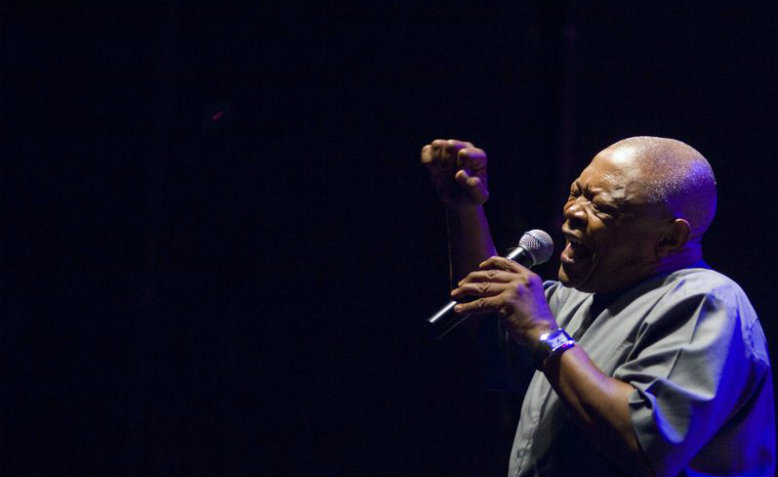 Photo: Flickr/Mário Pires
Photo: Flickr/Mário Pires
Hugh Masekala, the jazz legend and anti-apartheid activist from South Africa, passed away last week. Dave Randall looks at his extraordinary life and pays tribute.
South African jazz pioneer Hugh Masekela died last week at the age of 78. The trumpeter, flugelhorn player, singer and composer will be remembered as one of the musical legends of the anti-apartheid struggle. Not that he ever accepted his place on that pedestal. “The real legends,” he once rebuked an interviewer, “are the thousands of ordinary people who gave their lives to the struggle and whose names we don’t know. I am just a musician who is lucky to be paid for what he is doing – just good receiver of the gifts of the people I come from”.
He came from a coal mining settlement near Johannesburg and was given his first trumpet by a teacher called Trevor Huddleston – later Archbishop Huddleston and president of the British Anti-Apartheid Movement. The teenage Masekela blew his first uncertain notes in a country ruled by an increasingly belligerent white minority. Apartheid was not only physical and economic, but musical too, with the state broadcaster allocating just half an hour of airtime each week to music played and enjoyed by members of the black majority. That half hour fell on a Saturday afternoon when wealthy whites were usually out shopping. Masekela fondly remembered how black domestic workers in white suburbs would defiantly fling open the windows and turn up the radios filling the streets with popular African songs.
Despite the restricted opportunities and growing hardships inflicted by the apartheid system throughout the 1950s, Masekela managed to establish himself as a key figure in the embryonic jazz scene. In 1959 he joined Abdullah Ibrahim and Jonas Gwangwa to record the first album by a South African jazz band, Jazz Epistles Verse 1. In the same year he also played in a hit musical billed as an “all African jazz opera”, whose star was South Africa’s finest female singer Miriam Makeba. However, black success was not tolerated for long by the regime. Makeba decided to leave the country and her citizenship was revoked for taking part in the anti-apartheid film Come Back Africa. In 1960, the year of the Shapesville massacre and the banning of the ANC, Masekela also left. After a brief period in London he joined Makeba in New York City, where he befriended singer and activist Harry Belafonte and the jazz greats Louis Armstrong and Dizzy Gillespie. These African American musicians encouraged Masekela to develop his own South African style and to stay in the USA rather than risk returning to South Africa. In 1963 he released his debut album Trumpet Africaine and the following year married Makeba. The marriage lasted only two years, but they would continue to work together for decades to come.
In 1968 Masekela had an unexpected hit with the easygoing instrumental Grazing In The Grass. It topped the US pop chart for three weeks and he soon found himself playing at major festivals alongside huge rock acts such as Janis Joplin and The Who. He consistently used the platform to raise awareness about the situation in South Africa and to call for change.
After twelve years in exile, Masekela returned to Africa, travelling across much of the continent, collaborating with musicians including Zaire’s (now Democratic Republic of Congo) Franco, Nigeria’s Fela Kuti and Ghana’s Hedzoleh Soundz. In 1980 he settled in Botswana and founded the Botswana International School of Music.
In 1987, Masekela and Makeba found themselves at odds with much of the anti-apartheid movement when they agreed to tour with Paul Simon to promote his hugely successful album Graceland. The recording of the album contravened a UN-backed cultural boycott of apartheid South Africa. Pickets outside the London gig included Jerry Dammers – writer of the song Free Nelson Mandela. However, just a year later the comrades were united again onstage at Wembley Stadium for Nelson Mandela’s 70th birthday concert. Mandela himself was still imprisoned – it would be another two years before his release – but his birthday celebration was screened by nearly 100 national broadcasters to an estimated 600 million people around the world.
I recall one hot summer’s night in 2003, when Masekela performed at the Fridge nightclub in Brixton, South London, to celebrate Nelson Mandela’s 85th birthday. He began with his stirring version of the traditional hymn Send Me: “I wanna be there / When the people turn it around / When they triumph over poverty… I wanna be there / For the victims of violence and abuse / I wanna lend a hand…”. Masekela certainly did lend a hand. He also recognised that although apartheid formally ended in 1994, not enough really changed. He was often critical of the ANC leadership but also reminded people that many of the ongoing problems in South Africa were legacies of colonialism.
In later interviews he was keen to identify not as a South African, but as a human being from Africa. He often pointed out that Africans live within, and sometimes fight over, artificial borders created in the 1880s by non-Africans. His music recognised no such borders and on his final album No Borders he questioned why people put up with them. Masekela’s vision of a better world and his wonderful music live on.

